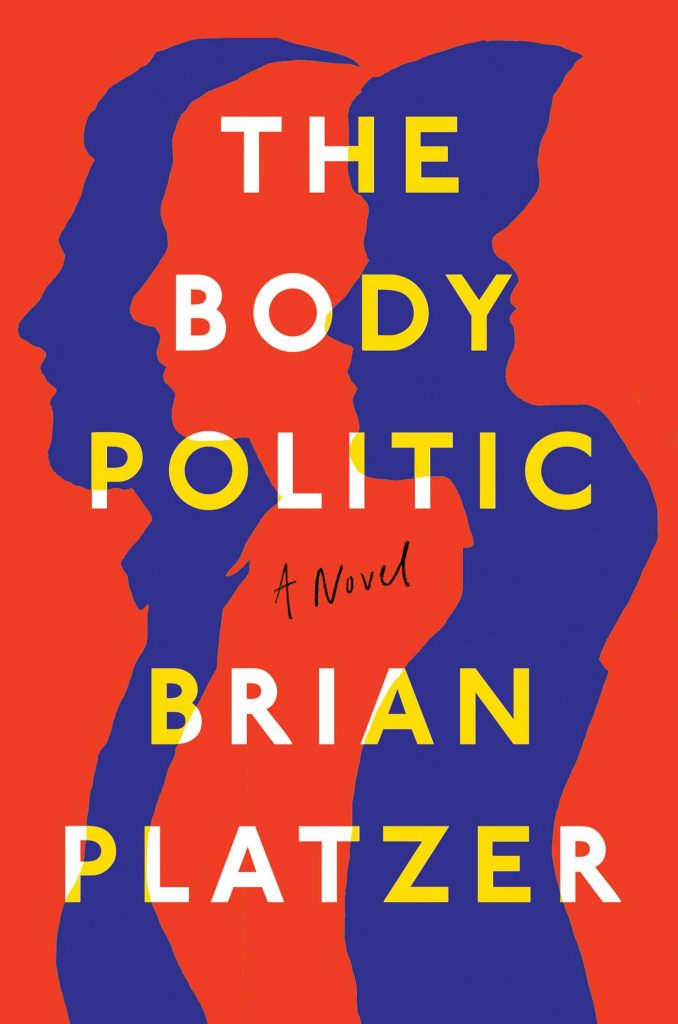
I didn’t know Brian Platzer super well in high school – we were in the same graduating class back in New York City – but I always felt like I should have. He was hilarious, and super smart, and one of those people who’s nice to everyone, even – especially – the people few others think to be nice to. I’m extremely gratified to announce that High School Me was apparently an excellent judge of character, because Brian has grown into the same hilarious, super smart, and kind person I figured him to be – oh, and he also happens to be one of the decade’s best new novelists, NBD.
I was wary of Body Politic when it first landed in my mailbox: I didn’t really want to read a novel having anything to do with politics, as I spend most of my day reading about just that, and I’m getting very, very close to that aneurysm I’ve been expecting since November 2016. I was also wary because I’m very picky about my fiction, and can’t bring myself to put the time into finishing an entire novel unless I absolutely have to – meaning because there is no alternative. Because I can’t put it down.
I could not put down Body Politic. My life came to a standstill for an entire weekend; everything else just had to wait. And it’s not actually about politics, exactly: It’s about four friends struggling with the devastating aftermath of a freak accident in the wake of Trump’s election.
The book comes out today, so I asked Brian if he’d answer a few questions for you guys while you wait for your copy to arrive (order it today! get it tomorrow! read it immediately!).

Oh, hello, Brian! It’s been a minute. I love your book. My first question: The central character in Body Politic – David – struggles with profound and chronic pain and dizziness. I hadn’t realized until I got to the acknowledgements that David’s neurological disorder was (I assume) inspired by your own. Can you explain why you framed his story in the context of Trump’s election?
Yeah it was a rough time. I was almost entirely incapacitated by an undiagnosable neurological disorder for the two and a half years after my second son was born. I was dizzy all day every day, my vision was blurry, and I couldn’t be alone with my kids, teach, write, or carry on a conversation in person or over the phone. Feelings of loneliness and inadequacy were exacerbated by the combination of constant suffering and the existential horror of not knowing if the suffering would last forever. After I finally found the medications that now give me a few hours of clarity each day, I wanted to process both my perspective and those of my wife, friends and family who’d endured it all with me.
Then Trump was elected, and the parallels between my illness and the political moment just snuck up on me. There was a comparable frustration, dread, disorientation, and uncertainty. Telling these two stories together put human emotions and decisions on a political scale and contextualized the characters in way that—I hope—makes their story more compelling.
You write women very – almost shockingly – well. How is the experience of getting into a female character’s head different? Or is it more similar than I might think?
Thanks! Though having two lunatic toy-truck-smashing boys at home has lately made me question some assumptions, I’ve always written women in the exact same way I write men. There are a lot of men (and women) who see women as fundamentally different in how they operate. I disagree. In my experience men and women both want emotional and financial security, love, sex, professional satisfaction. When I write I do my best to create real people—men, women, and children—and honestly depict what they want, why they want it, what’s standing in their way from their getting it, and how they try anyway. From this perspective, men and women are pretty much the same.
I write about my personal life as a matter of course, so I know that it comes with drawbacks – including the fact that your friends and family tend to be looking for themselves in your work, and aren’t always thrilled about their appearances. When your fictional writing contains elements of your personal life – as with David’s illness – does that color how people close to you receive it? Do you think they wonder, “Which character am I?” And do you find that a distraction during the writing process?
It’s a total shit-show. My basic approach to writing is to take people, situations, and insecurities I feel or see, and exaggerate and animate them to create more compelling characters and stories. Using my personal life as the raw material for my fiction constantly leads to people thinking I’m writing about them or, even more frequently, providing them insight into my life and the life of my loved ones. My wife takes the brunt of it. In my first novel, Bed-Stuy Is Burning, the main female protagonist makes some selfish, unethical professional decisions, and more than once our neighbors have stopped her to ask how she dare act so callously. I’m very lucky she understands how much these novels mean to me.
On a lighter note: Your five favorite spots in NYC?
Santa Panza, a Brooklyn pizzeria, Saraghina Bakery, The Strand Bookstore, Grace Church School, and Washington Square Park, but not near that sunbathing guy who feeds the birds.
Your five favorite books?
Baldwin’s Giovanni’s Room, Cusk’s Outline, Maugham’s The Razor’s Edge, Ishiguro’s Never Let Me Go, Roth’s American Pastoral.
Finally – what the hell, let’s do some political personality word association:
Mike Pence: Asshole.
John Bolton: Mustache asshole.
Mitt Romney: Moral asshole.
Kellyanne Conway: Sneaky asshole.
Adam Schiff: Seems sensible.
Al Franken: Would have been the next president.
I agree. Thanks for your time. Everybody go read Brian’s book!






